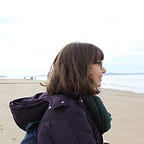#387: The Chiselled Words
How to make your words last
Walking around Durham Botanic Garden in winter it is clear: many things are impermanent. The fallen leaves that were once on the trees. The missing flowers that signs tell me were in the borders. The monkey puzzle tree without its branches, waiting to be cut down.
Plants will grow again, as the seasons shift, but they will be different. Not the same petals, not the same veins spreading through the leaves, not the same branches. They will be new.
Turning a corner, under some leaves, I find an object unchanged by the seasons, a carving of Basil Bunting’s poetry:
“Words!
Pens are too light.
Take a chisel to write.”
These words come from the poem ‘Briggflatts,’ in which they are uttered by the Mason. Were a real life mason to say these words, they would be as ephemeral as the petals decomposing in the ground. Around for a season, or rather the time it takes to utter them, and then gone.
Instead, they are immortalised in poetry by Basil Bunting, and made even more immortal (if that is possible) by being carved into stone. A fate only too fitting for lines uttered by a stonemason about the lightness, or rather intangibility, of words. With a nod and a wink, I can only assume Bunting was begging for someone to carve his penned words into stone.
I wonder, though, about the other writing materials we use now. Specifically, digital tools. A group of tools that are similar and yet with some distinctions. A typo-ridden scrawl into a notes app is more intangible than an edited and digitally published article. I think, too, about this blog these words are written on. Where does this medium fit into the spectrum of writing materials?
Of course, though writing with a chisel is a more permanent method, it is also far slower, far harder. To write with a chisel, you must choose your words carefully. In the Botanic Garden’s case, ten words plus four more for an attribution and dates. In contrast, writing on the internet is often criticised precisely because it is too easy. Too easy to produce unedited tomes, undigested responses, random drivel. Think about the sparing words carved onto a gravestone — names, dates, and perhaps a couple of words to summarise a whole person: “loving mother”. Writing with a chisel is a different art altogether.
This is not to dismiss the prolific, nor is it to undermine the democratising nature of writing online. I am doing it right now. It is instead to reflect, as we edge towards four hundred blog posts on our small corner of the internet. It is a self-awareness of our words that we have been typing away, and whether it is nearly time to pick up the chisel and carve them elsewhere.
The gardens change through each season, but new bulbs will birth new life in different places in different lifetimes.
I look forward to the passing of seasons. To the coming of spring.
